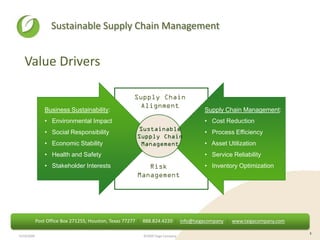
Building Resilience: Sustainable Supply Chain Management
In the contemporary business landscape, sustainability has become a cornerstone for success. Sustainable supply chain management is emerging as a strategic imperative for organizations aiming to minimize environmental impact, enhance social responsibility, and build long-term resilience.
The Foundations of Sustainable Supply Chain Management
At the core of sustainable supply chain management lies a commitment to integrating environmental, social, and economic considerations into every stage of the supply chain. This holistic approach goes beyond traditional supply chain practices, emphasizing responsible sourcing, ethical labor practices, and the reduction of ecological footprints.
Environmental Stewardship and Green Practices
One of the primary goals of sustainable supply chain management is reducing the environmental impact of operations. This involves adopting green practices such as eco-friendly packaging, energy-efficient transportation, and waste reduction initiatives. Organizations are recognizing the importance of aligning their supply chain practices with broader environmental conservation efforts.
Ethical Sourcing and Social Responsibility
Ensuring that products are sourced ethically and produced under humane working conditions is a fundamental aspect of sustainable supply chain management. Companies are increasingly scrutinizing their suppliers to guarantee fair labor practices, safe working conditions, and the protection of human rights throughout the supply chain.
Risk Mitigation through Transparency
Sustainable supply chain management enhances transparency by providing a clear view of the entire supply chain. This transparency not only fosters trust among stakeholders but also plays a crucial role in risk mitigation. Identifying potential vulnerabilities, such as dependence on a single supplier or exposure to geopolitical risks, enables proactive risk management.
Resilience in the Face of Disruptions
The integration of sustainability principles contributes to the overall resilience of supply chains. Sustainable practices often involve diversifying suppliers, incorporating redundant systems, and fostering innovation. These measures ensure that supply chains can adapt to disruptions, whether caused by natural disasters, geopolitical events, or unforeseen market shifts.
The Role of Technology in Sustainable Supply Chains
Technology plays a pivotal role in achieving sustainable supply chain management objectives. Advanced analytics, blockchain, and Internet of Things (IoT) solutions provide real-time visibility into supply chain processes. This not only enhances efficiency but also enables organizations to track and trace the environmental and social impact of their supply chain activities.
Circular Economy and Closed-Loop Systems
A key paradigm within sustainable supply chain management is the adoption of a circular economy model. This approach prioritizes the reduction, reuse, and recycling of materials, minimizing waste and contributing to a closed-loop system. Companies embracing circular economy principles are not only environmentally responsible but also position themselves for long-term cost savings.
Regulatory Compliance and Corporate Governance
As sustainability gains prominence, regulatory bodies are instituting stricter standards. Sustainable supply chain management ensures compliance with these regulations, safeguarding organizations from legal and reputational risks. Aligning supply chain practices with corporate governance principles reflects a commitment to ethical conduct.
Consumer Expectations and Brand Reputation
In an era of heightened environmental awareness, consumers are increasingly making purchasing decisions based on a company’s sustainability practices. Sustainable supply chain management is not just a matter of compliance; it is a strategic investment in brand reputation and customer loyalty. Organizations that align with consumer values are better positioned for long-term success.
Creating a Sustainable Future
In conclusion, sustainable supply chain management is more than a trend; it is a fundamental shift towards responsible and resilient business practices. Embracing sustainability not only mitigates risks and ensures compliance but also fosters innovation and opens new business opportunities. Organizations committed to building a sustainable future through their supply chains are laying the groundwork for enduring success.
Explore the Transformative Impact of Sustainable Supply Chain Management here.
